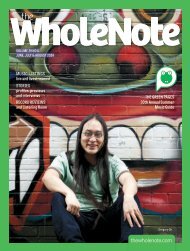Volume 25 Issue 6 - March 2020
FEATURED: Music & Health writer Vivien Fellegi explores music, blindness & the plasticity of perception; David Jaeger digs into Gustavo Gimeno's plans for new music in his upcoming first season as music director at TSO; pianist James Rhodes, here for an early March recital, speaks his mind in a Q&A with Paul Ennis; and Lydia Perovic talks music and more with rising Turkish-Canadian mezzo Beste Kalender. Also, among our columns, Peggy Baker Dance Projects headlines Wende Bartley's In with the New; Steve Wallace's Jazz Notes rushes in definitionally where many fear to tread; ... and more.
FEATURED: Music & Health writer Vivien Fellegi explores music, blindness & the plasticity of perception; David Jaeger digs into Gustavo Gimeno's plans for new music in his upcoming first season as music director at TSO; pianist James Rhodes, here for an early March recital, speaks his mind in a Q&A with Paul Ennis; and Lydia Perovic talks music and more with rising Turkish-Canadian mezzo Beste Kalender. Also, among our columns, Peggy Baker Dance Projects headlines Wende Bartley's In with the New; Steve Wallace's Jazz Notes rushes in definitionally where many fear to tread; ... and more.
You also want an ePaper? Increase the reach of your titles
YUMPU automatically turns print PDFs into web optimized ePapers that Google loves.
What was the first piece of Bach’s that changed your life?<br />
The Chaconne in D Minor from his Violin Partita No.2. A musical<br />
cathedral that he built to the memory of his dead wife. I love the fact<br />
that it keeps trying to end. But he always has one more thing to add.<br />
Like saying goodbye to the woman you love. Leaving the hospital<br />
room. And then returning to say that ‘one more thing.’ For me it was<br />
a kind of key to my mini, seven-year-old fucked-up soul that just fit<br />
right and made everything seem shinier.<br />
When did you begin to play the piano?<br />
Play, in the loosest sense of the word, when I was a kid. But I didn’t<br />
get my first proper teacher until I was 14. and then I stopped for ten<br />
years, aged 18, and restarted at 28. I wouldn’t recommend that.<br />
According to your website you had no formal academic musical<br />
education or dedicated mentoring until age 14 when you studied for<br />
four years under Colin Stone. Then, in your early 30s, you had a brief<br />
tutelage with Edoardo Strabbioli in Verona. Was that the extent of<br />
your training?<br />
Yep. But I like to think that dreaming, breathing, thinking about,<br />
listening, talking and inhaling music for all of my life was training too.<br />
That’s the magic trick with music. You can be<br />
at your most desperate and abandoned and<br />
suddenly there is a hand reaching out from<br />
300 years ago giving you a hug and telling you<br />
it’s all going to be ok.<br />
Who were your musical heroes in your youth?<br />
Sokolov, Gilels, Bernstein, Ashkenazy.<br />
Tuesday <strong>March</strong> 10 at 8 pm<br />
André Laplante,<br />
pianist<br />
Thursday <strong>March</strong> 19 at 8 pm<br />
Pavel Haas Quartet<br />
I love the story you told Tom Power on CBC’s q about the time a<br />
dozen years ago when you were in a locked psychiatric ward and not<br />
allowed anything, but a friend smuggled in an iPod filled with Gould<br />
and Bach and you heard Bach’s transcription of the slow movement<br />
of Marcello’s oboe concerto. “Something this profoundly beautiful –<br />
the fact that this exists in the world – means that it’s not necessarily<br />
a completely hostile place,” you said. It’s an example of the extraordinary<br />
power of music. There’s nothing like it. Please expand.<br />
Nah. Listen to the piece and it’s easy to get. That’s the magic trick<br />
with music. You can be at your most desperate and abandoned and<br />
suddenly there is a hand reaching out from 300 years ago giving<br />
you a hug and telling you it’s all going to be ok. And that piece is a<br />
perfect example.<br />
When did you first fall in love with Beethoven?<br />
As a very young boy, listening to the Emperor Concerto. Holy shit<br />
what a piece to fall in love with! It’s everything my tiny, geeky little<br />
mind adored – virtuosity, thrills, beauty and lots of big fucking drums.<br />
How did you choose the pieces for your Toronto recital?<br />
I wanted to find three sonatas that told a bit of a story and covered<br />
the basic arc of his life.<br />
You recorded all three sonatas [No.15 in D Minor, Op.28 “Pastoral”;<br />
No.27 in E Minor, Op.90; No.21 in C Major, Op.53 “Waldstein”] seven<br />
to ten years ago. Please describe your relationship with each of the<br />
sonatas and how your approach to them has evolved over the years.<br />
You know I think it was Arrau (or maybe Bolet) who said something<br />
really brave – along the lines of ‘LVB wrote the sonata and<br />
moved onto the next one. I’ve been studying these sonatas for 30,<br />
40, 50 years. I know them inside out. Have performed, memorized,<br />
Tuesday <strong>March</strong> 31 at 8 pm<br />
Benjamin Grosvenor,<br />
pianist<br />
Tickets: 416-366-7723<br />
option 2<br />
27 Front Street East, Toronto<br />
| music-toronto.com<br />
thewholenote.com <strong>March</strong> <strong>2020</strong> | 11


















